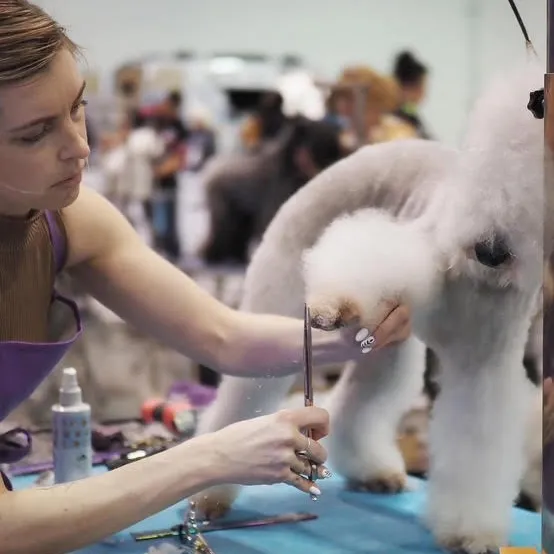
Bringing a dog into your home is an exciting and life-changing decision, but it also comes with responsibilities—especially when it comes to grooming. Charlene Walker, lead groomer and manager at FurBar with 12 years of expertise in grooming competitions and show grooming, has some important advice for potential dog owners. Her continued education and deep understanding of breed standards and dog health issues make her insights invaluable for ensuring the highest level of care is received at FurBar.
Groomers play an intimate and essential role in your dog’s health and well-being. They are often the first to notice health issues, before an issue is apparent enough that you’d bring your pet to their veterinarian. Because groomers inspect every inch of your dog’s skin, they can identify early signs of infections, injuries, allergies, or other concerns that might otherwise go unnoticed.
Different breeds have different grooming requirements, so before committing to a particular dog, it’s important to research and understand what your potential pet will need.
Regardless of breed, all dogs should be bathed at least once a month, as their skin cells regenerate on a 21-day cycle.
Some breeds have unique needs or ailments that they are prone to that should not be overlooked. Do your research on the breed you are interested in, but here are a few specific examples:
Cocker Spaniels – Their floppy ears restrict airflow, making them highly susceptible to ear infections. Regular grooming and ear maintenance can prevent these painful issues. This is an example where regular grooming directly impacts keeping a pup healthy and infection-free!
Huskies – Though they shed year-round, Huskies should never be shaved in the summer. Their fur helps regulate body temperature, protecting them from heat and sun exposure. In contrast, short-haired dogs often suffer the most in hot weather.
Doodles (Poodle Mixes) – These dogs are extremely popular, with 70% of FurBar’s clientele owning one. However, a common misconception is that they are all hypoallergenic. In reality, mixing a poodle with another breed does not guarantee a non-shedding coat. These dogs require significant grooming upkeep and often have unpredictable coat types.
Many new dog owners delay their pup’s first grooming appointment, which can make future visits stressful. It’s crucial to introduce puppies to grooming early so they become accustomed to the process. While it may never be a “fun” experience for them, much like a dentist visit for humans, early exposure prevents fear and unnecessary anxiety later. While every dog is different, noisy and stressful environments can be so overwhelming that they result in accidents, dog fights or even seizures in at-risk pups.
FurBar prioritizes each dog’s individual needs, tailoring grooming experiences based on their age, health, and temperament.
Puppy Packages – Designed to ease young dogs into grooming, these short sessions help build trust and prevent overwhelming experiences. It’s literally a baby step to the full grooming experience.
Senior and Special Needs Care – For older dogs or those with health issues, sessions are adapted to ensure comfort and safety.
Crate Safety & Express Services – Crating prevents accidents, and express services offer a one-on-one grooming experience for dogs with anxiety or health concerns so that they get the specialized attention they need to stay happy and healthy.
Most new dog owners underestimate the grooming requirements of their pet’s breed as well as the financial impact grooming can have- the biggest mistake Charlene sees with new dog owners is their lack of understanding grooming requirements and appropriate grooming schedules for their dog’s long-term health. Understanding your dog’s coat type, health risks, and grooming needs is something you’ll want to investigate prior to getting your dog. Grooming can also be quite expensive depending on the type of breed and coat type as well. Understanding what is required for each breed will help dictate the financial feasibility of bringing a puppy into your family. By choosing an experienced groomer like those at FurBar, you can ensure your dog receives the best possible care from puppyhood throughout their senior years.
